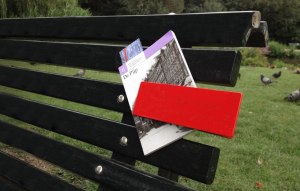 |
| Little Eaton, Debyshire, England. 2011 |
When living in Auckland, New Zealand in the late 90’s I was surprised and delighted to find a copy of The Number 1 Ladies’ Detective Agency on a bench with a note attached telling me to read it and leave it somewhere for the next person to discover. I chose a shaded wall by a beach and left it with a card saying how much I’d enjoyed the book – and to pass it on by leaving it in a public place. I felt as though I was in mystery myself; who might have left the book and what type of person would find it? Would they run with the baton or read it and ditch it?
Now I was on the look-out, eyes constantly scouring benches, walls and hidden nooks for more literary treasure. And what -do-you-know, there it was, that quintessential kiwi guide – The Edmonds Cookery Book, nestled in the crook of an iconic Pohutukawa tree. Five-months of searching vindicated! This time the book had a sticker with the name of a website where I could log my find, leave a comment and follow the book’s journey from beginning to end.
Now there are a number of similar ventures including BookCrossing.com which has over two million members who have ‘released’ almost ten million books into the wild in 132 countries. In 2004 The Concise Oxford Dictionary added the noun ‘bookcrossing.’
Villages, towns and cities around the world have embraced the idea. In 2009 the UK’s Daily Mail ran an article on a telephone-box book exchange, which was set up by a village in Somerset, England when their mobile library service was closed down. Today around 400 old telephone boxes have been purchased by parish councils, some of which have been converted into book exchanges.
 Amsterdam’s Pivot Creative came up with the idea of turning ten park benches into mini-libraries by creating a red clip to secure books and magazines to them. Pivot co-founders Paula Colchero and Jose Subero hoped that the initiative would “bring people back to the simple pleasure of reading a book, sharing with others, and enjoying common spaces.” Check it out here.
Amsterdam’s Pivot Creative came up with the idea of turning ten park benches into mini-libraries by creating a red clip to secure books and magazines to them. Pivot co-founders Paula Colchero and Jose Subero hoped that the initiative would “bring people back to the simple pleasure of reading a book, sharing with others, and enjoying common spaces.” Check it out here.
The idea isn’t new, commuters and travelers have always left newspapers and magazines on a seat or table for the next person rather than pop them in the trash can. But I do like to think of the treasure-trove of books waiting in trees and railway stations, on café tables, benches and walls, and the shadowy figures involved in the hidden-in-plain sight dead letter drops.
No comments:
Post a Comment